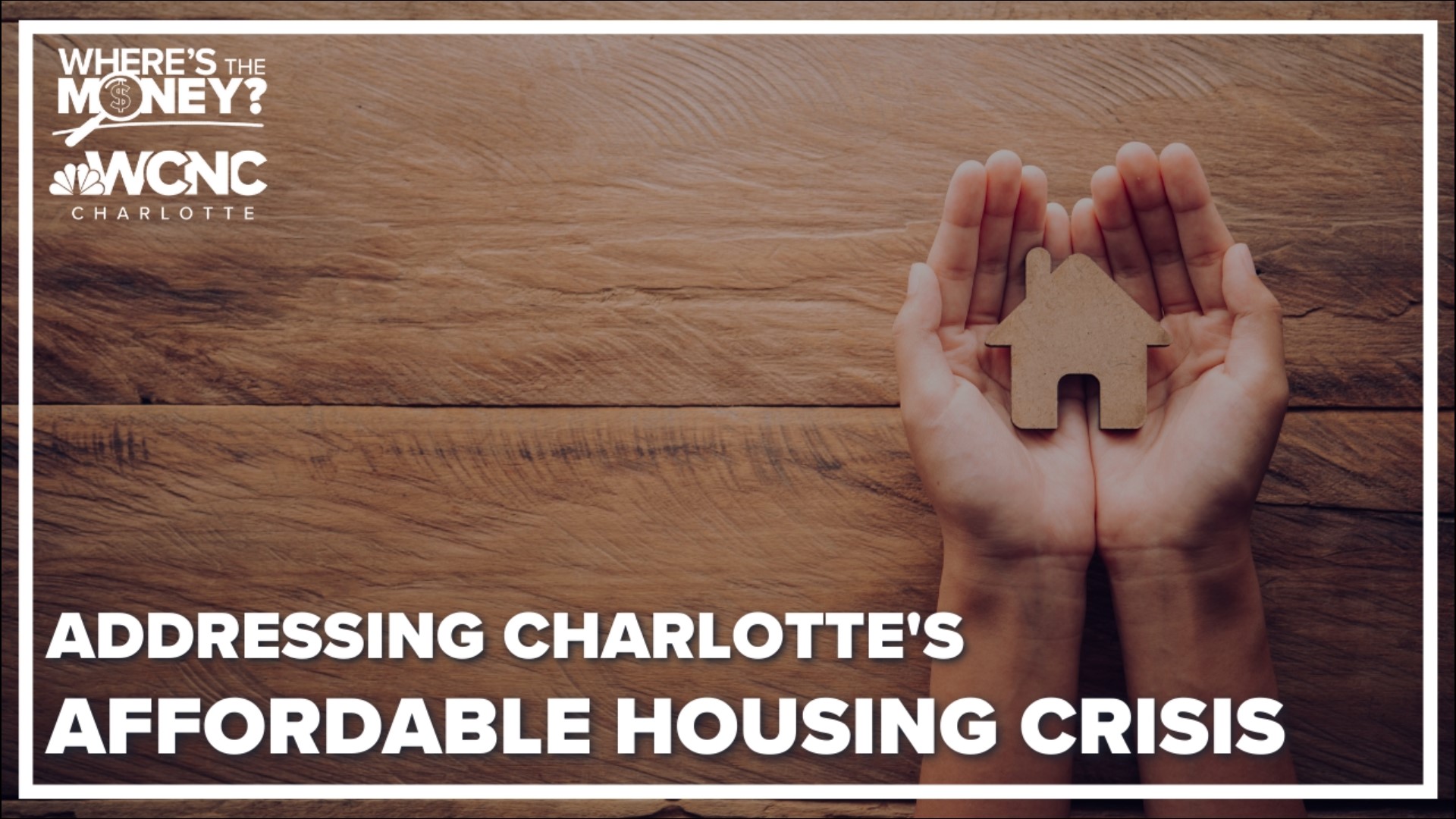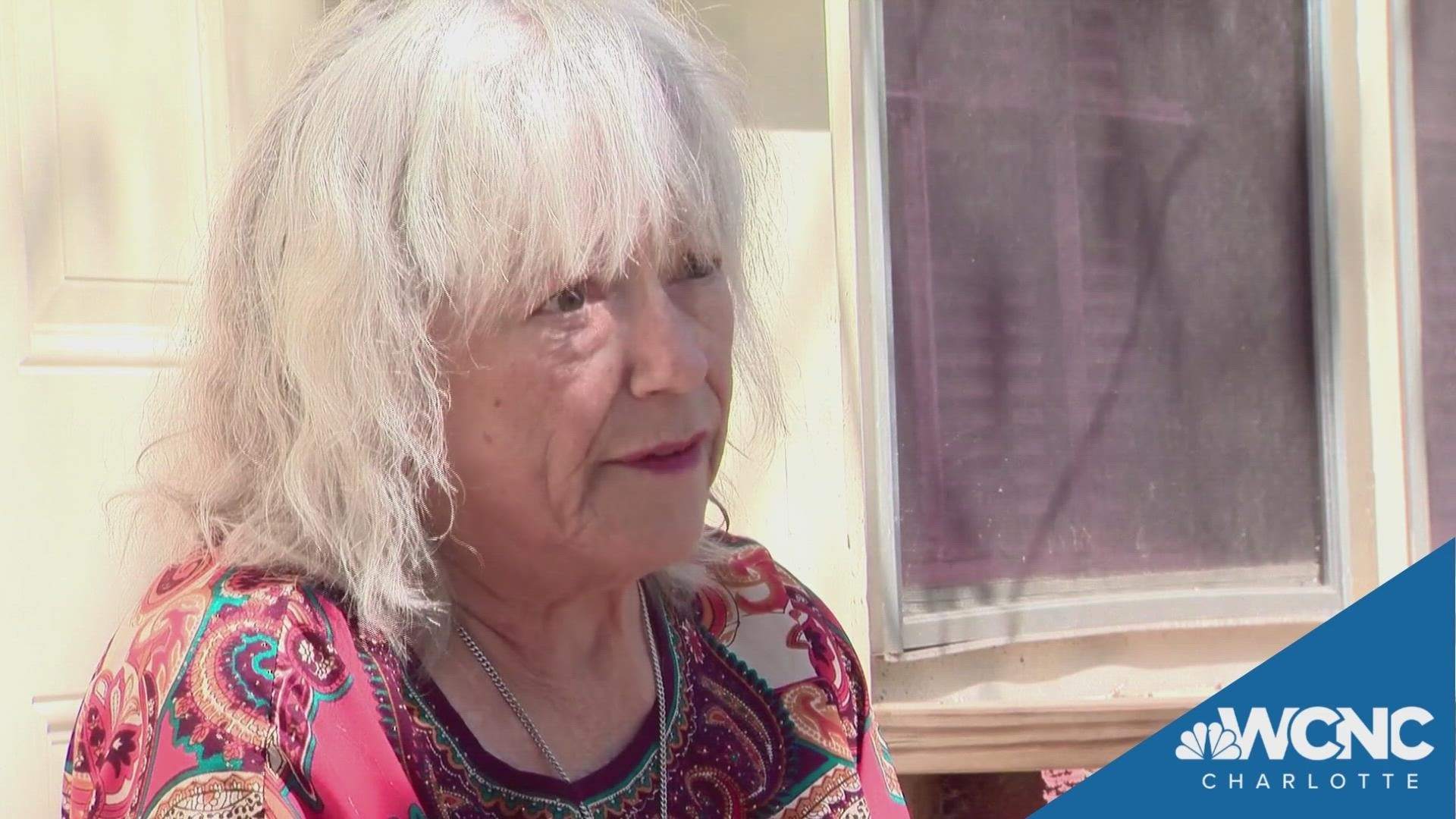CHARLOTTE, N.C. — A new approach to helping solve Charlotte’s affordable housing crisis is resulting in rents in the $400 to $500 a month range, sheltering working families who cannot afford to live anywhere else. It's called NOAH preservation, which stands for Naturally Occurring Affordable Housing.
Public records reviewed by WCNC Charlotte reveal the City of Charlotte has spent more than $218 million over the last two decades on housing, yet only has roughly 11,000 affordable units to show for it. What's more, just a third of those units are for people who earn the least.
Apartments like those at Shamrock Gardens in east Charlotte might just be the blueprint to help change that. Instead of tearing down older apartments, forcing renters to move out, and building new expensive housing in their place, Ascent Housing is renovating the older buildings. This means holding onto existing tenants and promising to keep their rents low.


The faces of affordable housing
Alice Hicks, 66, is among those who benefit. She lives on a disability check and said the complex is the only place she can afford.
"When I moved in, they had a senior discount: $430," she said smiling. "There is absolutely nowhere else I could go."
For every person like Hicks, there are about 23,000 other extremely low-income families who don't have an affordable home, because there are simply not enough apartments for their income bracket.


WCNC Charlotte is always asking "where's the money?" If you need help, reach out to WCNC Charlotte by emailing money@wcnc.com.
"Those are the people that are really working in the service sector, the essential workers. Theirs is the biggest gap in housing and that's really where most of the housing needs to be built," housing attorney and advocate Ismaail Qaiyim said.
Qaiyim said he's concerned by how few affordable units Charlotte's built over the last 20 years with its Housing Trust Fund, especially for people making less than 30% of the area median income (around $18,000 for one person and $25,000 a year for a family of four).


City leaders say more can be done
"It really hasn't made a large dent in that gap," he said. "Without there being constant pressure from below, a grassroots push in organizing, the money can be given to developers and at the end of the day, we don't have the result that we maybe want to have."
Housing Trust Fund data show the city's accelerated the creation of the most affordable apartments in recent years at a greater expense. This comes after voters approved millions of dollars in housing bonds. Even so, some Charlotte City Council members agree the city's efforts are falling short.
"We're still not doing enough for 30% and below," Councilmember Malcolm Graham said during a meeting in early April.
"The 0 to 30%, they're in the hotels. They were in Tent City," Councilmember Renee Johnson said.
"We're not succeeding right now," Councilmember Tariq Bokhari said. "In fact, we're failing."
To ensure developers would build more 30% AMI units, the City of Charlotte started requiring projects that receive money to set aside 20% of the units for people living at 30% AMI or below. A WCNC Charlotte analysis of Housing Trust Fund data found several recent taxpayer-funded projects created the bare minimum number of 30% AMI units required.
One project is projected to fail to reach the minimum. Easter's Home, a rare permanent supportive housing development helping transition people from chronic homelessness, is expected to produce 19% of units for 30% AMI households (4 out of 21).
Caldwell Presbyterian Church is partnering with DreamKey Partners on the project. Rev. Dr. John Cleghorn said their model "is fluid and evolving while still working within the needed requirements for a variety of funding sources."
"What we know for sure is that 100% of the units will be for those earning 50% or less of AMI..." Rev. Cleghorn told WCNC Charlotte. "...We are finalizing the funding phase of the project and hope to begin construction late this year or early 2023. This is a highly complex and creative model that will provide new and safe housing for those earning among the lowest incomes in a comfortable neighborhood and with access to needed amenities and resources. We are grateful for the partnership of our State and Local governmental funding partners as well as those of this and other congregations."
DreamKey Partners noted the project added an additional unit during the final design, which impacted the percentage of 30% AMI units.
"Therefore, the 30% AMI unit percentage dropped to 19% but the City is still getting four 30% AMI units and is also getting one additional 50% AMI unit with the same Housing Trust Fund investment," DreamKey Partners Senior Vice President of Marketing and Communications Noelle Bell said. "Importantly, Easter's Home is for individuals coming out of homeless situations, and even the 50% AMI units will be occupied by voucher holders, which means that more people at 30% AMI will be served beyond the initial four."


Another project, 7th Street Apartments (now called Varick on 7th), also only hit 19%, but a city spokesperson said the Charlotte City Council revised expectations.
Laurel Street Senior Vice President Lee Cochran said COVID impacted financing on the project, which originally called for 100 units in all, 20 reserved for households at 30% AMI and 50 considered affordable.
"Because of the effect of COVID and supply chain disruptions on overall construction pricing, Laurel Street had to work hard to bridge a funding gap for the development," Cochran said. "As part of our solution, we were able to increase the number of total units at Varick on 7th to 105, which allowed us to increase the total number of affordable housing units to 53. We maintained the number of units affordable to 30% AMI at 20 units. So while the percentages changed slightly because of the increase in the total number of units, the total number of units at 30% AMI was maintained at 20 and the total number of affordable housing units increased."
City data show that the project also created 52 market-rate units. Records show a few other projects hit above 19.5% toward the 20% goal, so the city rounded up.
Qaiyim wants to make sure all projects are hitting their marks.
"If you take money and you say you're going to build something and you don't build it, there has to be a means to hold you accountable," he said.
City auditors are in the process of reviewing the Housing Trust Fund "to ensure the program was administered in accordance with applicable City requirements," according to the monthly audit plan.
A possible blueprint for success?
Shamrock Gardens, meanwhile, reserved well over 20% of its units for residents who make the least. The company designated almost a third of its apartments (80 out of 265) for those making 30% AMI and below, data show.

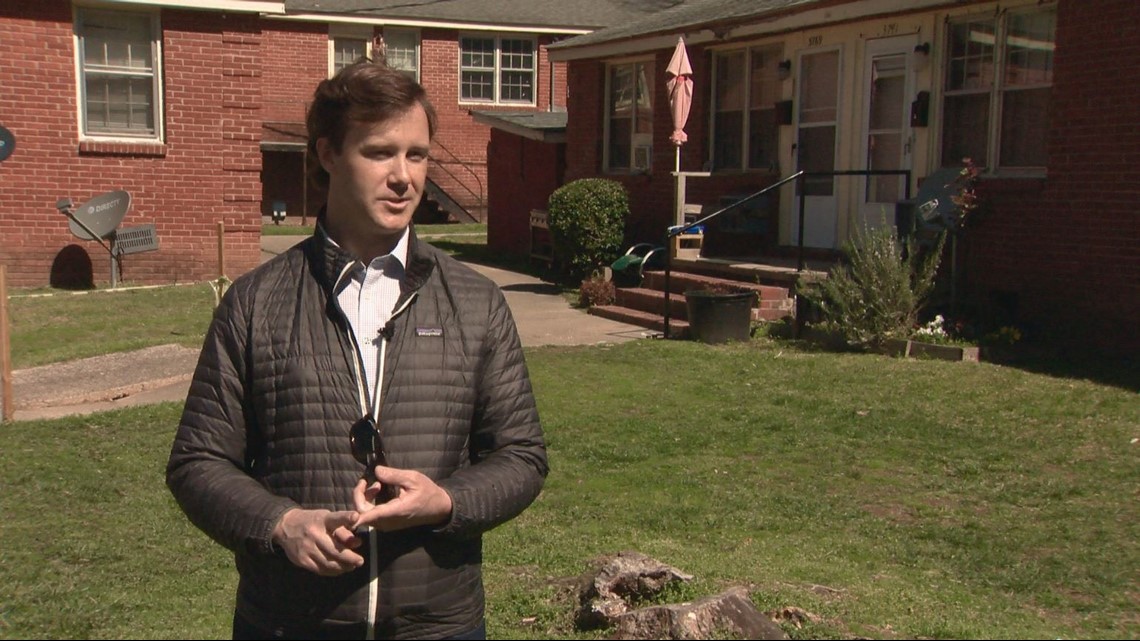
"Rents for those families will typically be $400 a month or less," Ascent Housing partner Mark Ethridge said. "We wanted to make as big as a commitment as we felt was prudent to try to help that, because we feel like that's where housing insecurity is most severe."
The company is able to keep rents low through what Ethridge calls a first-of-its-kind program that turns its property taxes into rental subsidies.
"It was really pioneering for both the county and the city to do a pilot rental subsidy program like this. No one in the country has ever turned property taxes into rental subsidies for 30% AMI households and it's one of the elements of our work that I'm most proud of," he said. "I really want to commend the city and the county for believing us when we said this would work. It has worked at past projects and it's something that I think could be a model for the entire country."

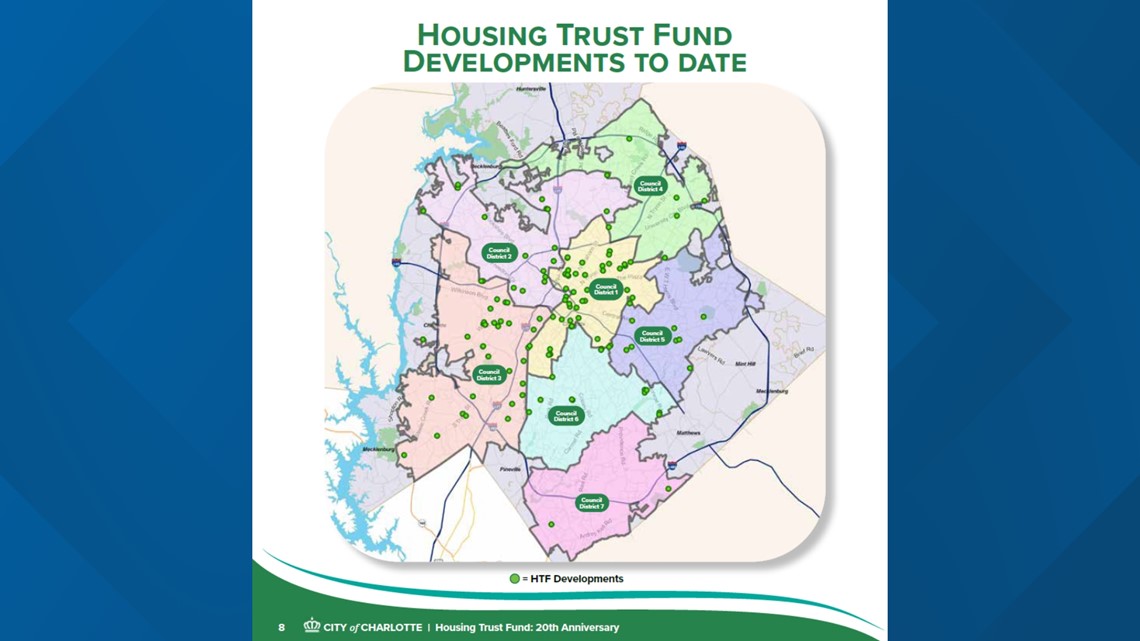
WCNC Charlotte is committed to reporting on the issues facing the communities we serve. We tell the stories of people working to solve persistent social problems. We examine how problems can be solved or addressed to improve the quality of life and make a positive difference. WCNC Charlotte is seeking solutions for you. Send your tips or questions to newstips@wcnc.com.
Ascent is in the midst of an $8 million renovation at Shamrock Gardens complete with new doors, windows, air conditioning units, and more. The company has several other NOAH complexes across town.
"Any answer to the housing crisis has to involve building new affordable units, as well as preserving NOAHs for us to make an impact to our current deficit," Ethridge said. "I live about a mile away from the project. I see how vulnerable the neighborhoods are to the growth that's coming from Center City and outward and when a property like this, that's been affordable for folks for decades, gets bought by somebody else, the outcomes are usually terrible for residents."
"They're getting a $500 a month rent hike or their building's getting knocked down and they have to find somewhere else to live," Ethridge added. "The ability for us to buy market price, to put an $8 million renovation in, and to keep rents affordable, both for existing and future residents, is something that definitely gets me out of bed in the morning."

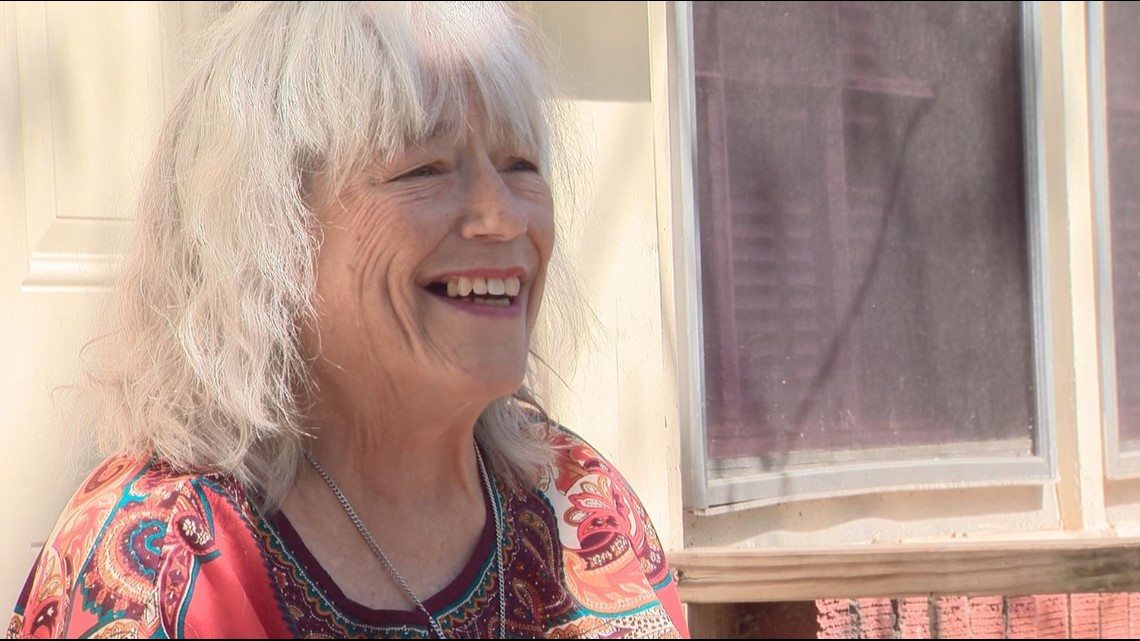
For Alice Hicks, having a place to live is the ultimate comfort.
"A wonderful relief," she said. "You have to have a place to live and I just feel so fortunate that I found this place and got in while there was still a place for me."
The Charlotte City Council just approved seven more Housing Trust Fund projects earlier this month. Developers will use more than $12 million to create about 600 affordable units. Fewer than 25% of those units will be for people who make the least.
The Housing Trust Fund has also created just under 900 shelter beds and 744 market-rate units over the last 20 years, according to city data.
If you or a loved one are experiencing homelessness, here are some resources in Charlotte you can access:
You can read the city's full Housing Trust Fund 20th Anniversary Report below:
Contact Nate Morabito at nmorabito@wcnc.com and follow him on Facebook, Twitter and Instagram.
WCNC Charlotte is part of seven major media companies and other local institutions producing I Can’t Afford to Live Here, a collaborative reporting project focused on solutions to the affordable housing crisis in Charlotte. It is a project of the Charlotte Journalism Collaborative, which is supported by the Local Media Project, an initiative launched by the Solutions Journalism Network with support from the Knight Foundation to strengthen and reinvigorate local media ecosystems. See all of our reporting at charlottejournalism.org.

